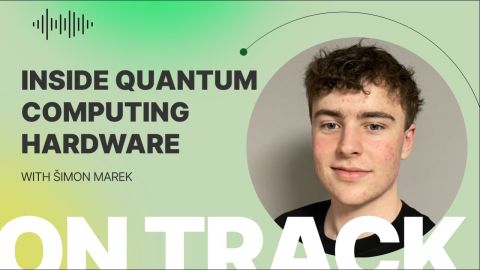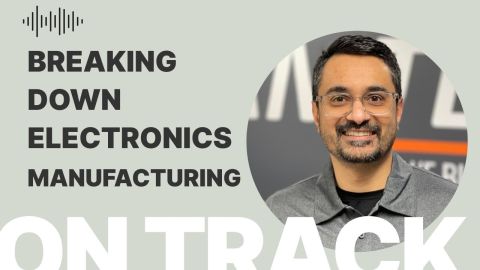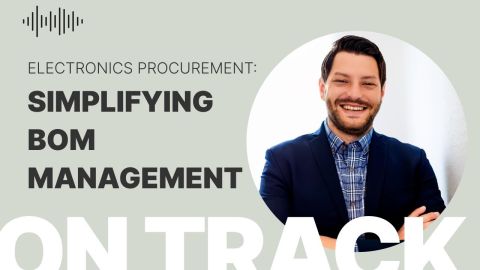What is in the PCB Bill?

In this episode, Representative Moore, one of the co-sponsors of H.R.7677, the Supporting American Printed Circuit Boards Act of 2022, will give us brief but insightful details about the bill.
Listen to Podcast:
Download this episode (right-click and save)
Watch the Video:
Show Highlights:
- Representative Blake Moore explains the reasons behind the efforts to push the Supporting American Printed Circuit Boards Act of 2022
- Rep. Moore briefly touches on the topic of material sourcing and potential environmental challenges
- A potential roadblock concerning raw materials is overcoming challenges coming from the energy and commerce committee
- What is the ideal market share for the US in the PCB manufacturing industry?
- The CHIPS Act and defining industrial policy
- Initiatives in developing a qualified workforce that can fill the new manufacturing jobs and all of the other jobs that come along with it to support the industry
- Sign up for the Electronic Design to Delivery Index to help guide you through supply chain turmoil
Links and Resources:
Sign up for the Electronic Design to Delivery Index
Learn more about the Supporting American Printed Circuit Boards Act of 2022
Learn more about the CHIPS Act
Watch the related episodes:
Data Security, 5G and Onshore PCB Manufacturing with Dr. Rob Spalding
IPC CEO John Mitchell on the Supporting American Printed Circuit Boards Act
The Benefits of Diversifying PCB Industry Supply Chain
Full OnTrack Podcast Library
Altium Website
Claim the special offer for Podcast listeners only
Transcript:
Zach Peterson:
So, is there an objectively best number or market share for American printed circuit boards? I think everyone agrees that maybe 50% doesn't make sense, and maybe 4% doesn't make sense. So where do we meet in the middle? What's the number we should all be aiming for?
Blake Moore:
More.
Zach Peterson:
Hello everyone, and welcome to the Altium OnTrack podcast. I am your host, Zach Peterson, and today I'm very happy to be sitting down and talking with Congressman Blake Moore, the Republican representative from Utah's First District. If you've been following the news lately, especially news in the electronics industry, then you know that Representative Moore is one of the co-sponsors of H.R.7677, the Supporting American Printed Circuit Boards Act of 2022. Representative Moore, thank you so much for taking time out of your busy schedule to talk to me today.
Blake Moore:
Thank you, Zach. Absolutely. I mean, we put together the legislation, so we want folks to know about it.
Zach Peterson:
Yeah, definitely. Maybe if you could, for our audience who may not follow politics and legislation, things like this so much, if you could possibly summarize what's in the bill?
Blake Moore:
Absolutely. So there's a need, and I think that regardless of whether you're involved in politics or not, you know that there's a need and major issues with our supply chain. And when we go through something like the pandemic, we recognize there was issues in numerous different industries, agriculture being one of them. Everybody saw that first hand. Then as you dig in a little deeper in my role on the Armed Services Committee. Plus I have a few key manufacturing plants of printed circuit boards in Utah in my district. It was very clear that this is an issue, and this is going to be a bigger issue going forward, unless we as a nation can bring some of our manufacturing back to the US. Years ago, several decades ago, printed circuit board, semiconductor manufacturing, we had the market share, basically, in the U.S. And we've ceded that just with a globalist society and opportunities that come from that on naturally going towards cheaper labor markets.
That happens to most any industry, and I'll discuss it and embrace it. There's benefits to our nation that comes from that. We need to find ways to continually be a strong exporter of numerous industries. But this industry in particular has national securities concerns, and we cannot see this ability to manufacture printed circuit boards in the larger semiconductor industry to adversarial nations. When we do that, we're at a national security risk.
So this started, my effort started, within the Armed Services Committee and working with our DOD to make sure that the DOD was required to use and purchase PCBs from US-based manufacturers, and, at minimum, allied countries. What this grows into is an opportunity to leverage our defense work, shore that up with strong manufacturing, and then grow that naturally, so we get scale, so we can continually build out our presence on general printed circuit board manufacturing. So this goes kind of beyond just the defense world into general manufacturing markets. Everything needs PCBs and everything needs semiconductors, as we know now. People are waiting for vehicles that they've purchased on the supply line because they don't have chips and everything available to that.
Printed circuit boards are a key component of the larger semiconductor industry. What this legislation does, this establishes a financial assistance program within the commerce department for American facilities to manufacture and research PCBs, again, printed circuit boards. It also provides a tax credit for entities that purchase American manufactured PCBs. So it's kind that opportunity to find research capability and assistance there, as well as tax credits and be able to get back our PCB manufacturing, first in DOD and defense world. And we continually grow that organically, that's going to have broad implications across our nation, quicker supply chain timelines, and ensuring that we have quality products that meet national security concerns.
Zach Peterson:
Sure. Understood. And I agree with you that the expansion beyond just DOD and defense is something that is sorely needed, especially when I talk to designers who are a bit more experienced than myself and who have noticed the decline in the domestic industry. But one thing I'm curious about is, when we talk about printed circuit boards, should we only be focusing on fabrication and assembly, or does the industrial base for all the raw material inputs also need support? And is that the type of thing that is also outlined for support in this bill?
Blake Moore:
So we have to consider that. That actually has broader implications, because the material that's going to be used for that with the resins and copper and all of the raw materials, they have broad implications. That's a trickier issue, because all of that raw material doesn't just go to PCBs, so how do you zero in on that? And it's an interesting crossover because another committee that I'm on is Natural Resources where we are constantly dealing with this issue of, what are we able to mine here in the US? What we could, but we're not willing to? And, where we're going to get that material. There's so many concerns that I have that we're not taking advantage of enough American natural resources, given the fact that we have a very responsible industry that does things that are strong with regards to environmental stewardship and things like that, that I know other nations aren't.
I'm a proponent of making sure that we have that type of stuff shored up, just for the broad implication across our entire manufacturing industry, not just even in semiconductors, and definitely not just within PCBs. So it needs to be taken into consideration, but that's that's going to go beyond the scope of what we can specifically focus on here, but it is definitely important.
Zach Peterson:
So if it does go beyond the scope, but I think we can all accept that those raw material inputs are important, what other legislative or funding mechanism would be used to try and channel funding in that direction to help shore up that industry? Would it be done through subsequent NDAAs?
Blake Moore:
I wish, because new NDAA actually gets past each year. And that's my hesitation, because I really do wish that it could ultimately be something as straightforward as that. But go listen to any natural resources committee hearing or energy and commerce, and there's a constant battle between what we're willing to take advantage of here in American natural resources and versus what we have to rely on overseas. There's a give and take here, and I don't feel like we're in the best spot to address this. So what it takes legislatively, it's going to have to go through some other committees and outside of just DOD because it has everything to do with, again, natural resources, which this would definitely have jurisdiction with that committee, along with energy and commerce.
This is where you run into a lot of issues in Congress. We're talking about an issue that has tax credits, extraction, international supply chain, manufacturing, all of that. We just talked about four major committees and the jurisdiction that they have. Where do these things get ultimately done, because ways and means, and energy and commerce, are probably two of those committees that would directly deal with what we're discussing with respect to raw materials, and they're already concerned about it, but there's constant gridlock in how we necessarily approach this.
Right now, Democrats are in control, and they have the gavels on these committees. What you're seeing is, in the future, we don't want to be doing this. You saw that particularly with the oil and gas industry with President Biden's secretarial order, as well as his Keystone Pipeline cancellation. But the secretarial order disallows future leases for oil and gas extraction on federal lands. And there are still opportunities currently before that ultimately blocks you from doing any extraction on federal lands right now. But it signals, "Hey, we're going to go away from this." And there's that similar sentiment in the mining industry. But then there's also, "Well, we need wind turbines, and solar panels, and everything related to more renewable resources." But they require that same raw material.
So this is not just a simple semiconductor PCB issue of where we're going to get these raw materials. This is a broader implication on how Congress needs to come together and figure out what we need to do to make sure the raw material industry and our ability to extract those raw materials for good purposes, and semiconductors, renewable technology, all that is has a good purpose. If we're going to signal that we're going to go away from it, but we also need it, it just doesn't work well in the marketplace. Then we end up ceding some of that power to our adversarial nations overseas, and we can't rely on that. That's what we go back to with the PCB bill, the whole effort from a PCB from the start for me. As this has grown, was to make sure that we shore things up within our borders so we can have what we have to be strengthened and to lead the world.
Zach Peterson:
So you noted earlier the market share of US PCB production has fallen, and I think the number is at around 4%. Prior to that, maybe 25 years earlier, it was something like 50%. Is there an objective-
Blake Moore:
That's a rapid decline, and reversing it is going to take some work. But yeah, those are the numbers that I understand as well.
Zach Peterson:
So is there an objectively best number or market share for American printed circuit boards? I think everyone agrees that maybe 50% doesn't make sense and maybe 4% doesn't make sense, so where do we meet in the middle? What's the number we should all be aiming for?
Blake Moore:
More. And again, I've used the term organic in this discussion. I am not somebody that just needs to, for lack of better word, no pun intended, fabricate, because of the fabs. To fabricate or dictate exactly where the marketplace should be. But we need to be able to be competitive. We need our resources and the incentives in place for our industries in the US to be able to get some of this back. That's the whole argument with the CHIPS Act, which was largely supported by most folks in Congress. Two main things took Republicans away from it at the very last minute. The CHIPS Act was added $60 billion to mandatory spending, and we just cannot continue to add to mandatory spending. And I could get into that whole discussion if you'd like, but adding to mandatory spending is a huge, huge problem for our budgeting capabilities going forward.
And second, it was how they were being leveraged. So this CHIPS bill was being leveraged to eventually get enough Democrats on board for the most recent budget reconciliation bill called the Inflation Reduction Act. And so they were leveraging that. So trying to just stop all of this enormous spending right now in our nation, which has led to inflation. Those are some of the reasons. Otherwise, the CHIPS Act is not like it a horrible, negative bill. We just don't like the mandatory spending aspect. But we do need to be competitive, and so finding opportunities for proper tax incentives to help us build some of that market share back is going to be a step in the right direction. We'll see where it takes us.
If we were at 25%, that would be a huge, huge win in my opinion, to get us back to that. Because otherwise, that 4% that we have it literally just eventually goes only to DOD because that's an area we can really control. Because I'm not going to dictate what every private industry is willing to do, and they need to be able to make their margins, and you have to use foreign manufacturing to do that, just because of the way the labor shift has happened in our world. We need to get back on track so they have a fighting chance to build that scalability so they can be a reliable option, that's not only reliable in timing and supply chain, but also price.
Zach Peterson:
So I guess this leads to a good follow-up, because in a previous episode with General Rob Spalding and in one of his forum club talks from, I think, a couple years ago, he noted that countries like Germany and Japan have a national industrial policy that guides production efforts. He had implied that the US should seriously consider something similar. So it sounds like you are content to allow the market to determine the appropriate size of the domestic industrial base, particularly with respect to printed circuit boards, and essentially to allow the government to nudge the industry along with investment and incentives. Or, do you think there is some justification, possibly, for the US to take a more active role in defining industrial policy, whether it's for electronics or some other industry?
Blake Moore:
This question is at the heart of the CHIPS Act. I think most lawmakers are comfortable with putting together some industrial policy with regards to an important industry like this. We're not going to do it for every industry, but this one has such broad implications. Semiconductor industry, like I said, affects missile technology, and it affects that truck that you're going to buy off the showroom floor, and in every piece of electronic equipment we have in our homes.
So this has broad implication. We get that this is important. Where the breakdown was on the CHIPS Act was just the size of it, and the incentives, and the mandatory spending piece. But it doesn't mean that we shouldn't be able to put some type of policy. We have to be competitive with other nations. And then that was it. Like, well, if we don't do this, we're going to lose this, we're going to lose this to Germany. And there was debate on whether that would actually happen.
What I can say is, first and foremost, what we need to remember and focus on always as American industry is the Tax Cut and Jobs Act put us in the right position where you automatically are incentivized to build an industry, build a business, here within our borders, because we became globally competitive with our tax rates. That was huge in incentivizing companies of any industry to not just say, "Oh, it's going to be 10% cheaper for us to go and set up shop overseas or in a foreign country, even if it's a neighboring country as well." That has worked. We've seen that. We've seen tax revenue actually grow from the Tax Cut and Jobs Act. So that already provides a strong enough incentive that we need to constantly remember. And companies that are saying, "Well, we either going to go to Germany or not," you have a really good setup here with the Tax Cut and Jobs Act.
Now, Tax Cut and Jobs Act has added to the deficit and we've got issues with regards to our spending that we need to be able to bring that down. But with respect to tax policy for companies, that's already a solid investment or incentive to be able to set up shop and do your business here. You get to be here in the US, be a part of this workforce that's envied across the globe. I know Germany, those are great opportunities and great investment and great industries there. But I still think we can be more competitive if we're at a tax rate, just as the general tax rate, if we're even, then we can do that. But you're right. Those companies are putting a lot of focus on this, and so we do as well.
And again, the CHIPS Act passed, and we'll have to see how it plays out. But with TCJA, we've already got a really strong incentive for companies to be here doing their business.
Zach Peterson:
Well, an important part of competitiveness is, of course, a well trained knowledgeable workforce. There are some industry groups, particularly IPC, who have noticed that there is going to be a massive workforce crunch in the PCB industry, and, I think, with electronics engineers in general. And so if we start to see a resurgence in PCB manufacturing, as well as the expected resurgence in semiconductor manufacturing in the US, what can government and industry do to ensure that we are developing a qualified workforce that can fill these new manufacturing jobs and all of the other jobs that come along with that to support the industry? Do we need more H-1Bs? Is this going to be led by industry? Or is this in partnership with academia? Do we need more of these STEM partnership programs in schools? What's your take on this?
Blake Moore:
I'm very supportive of more H-1Bs, let me just state that in forefront, as long as they're coming from countries that we trust. I have concerns about too much integration. That caveat said, we do need more H-1Bs. We need more H-1As. The agriculture community, the manufacturing community, desperately needs this. Our birth rates are decreasing; In Utah we do okay. But we need to definitely address that. But, the more systemic way to fix this and the more sustainable way to fix this is to allow for what I saw starting to take place in COVID, as workers were displaced and they went back and got upskilled and did new training and certification programs. We need to embrace that wholeheartedly. Our higher ed institutions have become lazy to some degree, just thinking about, "Oh, we're going to teach students how to think, and we're going to be very this and that." That's all well and good, and I'm okay with a broad education, but we need to be hyper focused on the jobs of tomorrow and building that into our curricula at our higher ed level.
I think there is a really good model here in Utah. Let me highlight just a few things. One, high school juniors and seniors can go to a tech center. I had these technical colleges back when I was going to high school. There was a stigma about them and they weren't going to be very great paying jobs and things like that. That's gone now. That I'm seeing get wiped away, which I love. So high school juniors and seniors can go to these schools for free tuition. They can learn a skill, computer programming, audio visual, there's numerous different types of things that they can do, EMT services, whatever. They can go and take that skill and do that while they're earning a four year degree, which is great. These do not have to be one or the other. So embracing building up our tech centers, our community colleges, to make sure we're doing these welding programs, chip manufacturing capability. These kind of things have got to be embedded, and we have got to make our higher ed system far more nimble than it was even just five years ago. The focus needs to be heavily on workforce development.
So again, in Utah we have the tech center side, but we also have our major universities fully embracing this with dynamic credentialing and certification programs. But they're going directly to industry. Go look at a rail company that the manufacturers trains and things like that. It's called Stadler, it's a German company, but they're based here as well. They work so closely with higher ed institutions on what we need. Companies need to go to these universities and say, "Hey, here's the program we need. Can you help us train up your students?" And you'll have 30 jobs waiting for them as soon as they're done. That is what will incentivize universities to make this switch into just going to school to go to school. It's going to school for a purpose so we can build that workforce.
So again, you've highlighted it in your question. We do need to embrace an immigrant workforce, as well as making sure that our higher ed is transitioning into more of a workforce related issue than just more of a liberal arts type of thing. There's a place for it, and there's still going to be people wanting to do that, but they have to know that the jobs are waiting and they're ready to be filled, and they are good, strong, high paying jobs.
Zach Peterson:
Totally agree with you. I think we're just hitting our limit on time, so I want to say thank you so much for joining us today. This has been a really great discussion, and it's good to actually talk to somebody who's in the trenches working on these initiatives, because for those of us who aren't in Washington, I think some of this looks pretty opaque. It's great to hear it directly from you.
To anyone who's out there listening, we are going to have some links in the show notes where folks can learn about the ultimate platform. Also, you can sign up for the Electronic Design to Delivery Index to help guide you through supply chain turmoil. Last but not least. I want to thank Representative Blake Moore once again for joining us to talk about H.R.7677, the Supporting Print Circuit Boards Act of 2022. To everyone that's out there listening, make sure to subscribe, don't stop learning, stay OnTrack, and we will see you next time.










